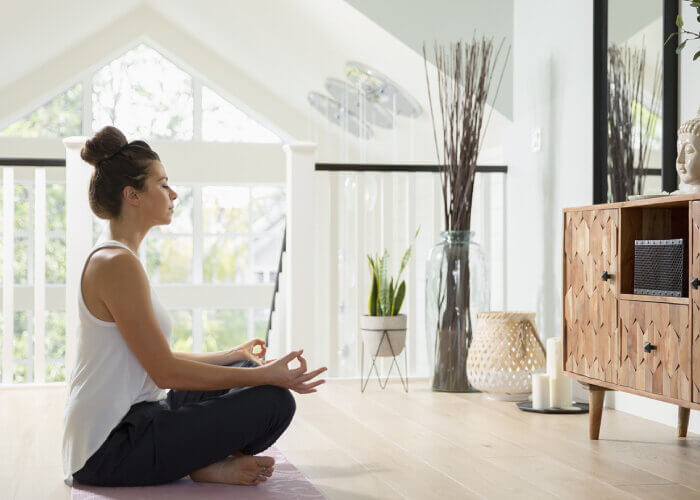In today’s fast-paced world, stress has become increasingly prevalent, affecting both physical and mental health. Creating a home environment designed for relaxation and calm is essential for managing stress effectively and promoting overall well-being. Incorporating stress-reduction practices into your daily home routine can make a significant difference in your quality of life.
Start by establishing peaceful spaces within your home. Designate specific areas where you can retreat and unwind, free from distractions and electronics. Whether it's a cozy reading nook, a quiet meditation corner, or a serene outdoor garden spot, having a dedicated space helps anchor your relaxation routine, allowing your mind to disconnect from daily stresses.
Consider implementing calming decor elements throughout your living areas. Opt for soothing color schemes, such as pastel blues, greens, and neutrals, which naturally evoke feelings of tranquility. Additionally, incorporate elements of nature like indoor plants, wooden furnishings, or natural textiles. These natural components can significantly reduce anxiety and enhance mood.
Consider implementing calming decor elements throughout your living areas. Opt for soothing color schemes, such as pastel blues, greens, and neutrals, which naturally evoke feelings of tranquility. Additionally, incorporate elements of nature like indoor plants, wooden furnishings, or natural textiles. These natural components can significantly reduce anxiety and enhance mood.
Aromatherapy is another powerful tool for stress reduction. Scents like lavender, chamomile, and eucalyptus are renowned for their calming properties. Utilize diffusers, scented candles, or essential oil sprays to infuse these soothing aromas into your home environment, promoting relaxation and improving sleep quality.
Prioritize regular physical activity within your home setting. Simple routines such as yoga, stretching exercises, or home workouts significantly reduce stress levels by releasing endorphins, which naturally elevate mood. Establish a consistent exercise routine that suits your lifestyle, helping you maintain physical health and emotional balance simultaneously.
Mindfulness and meditation practices are excellent for reducing stress at home. Dedicate a small portion of your day, even five to ten minutes, for quiet reflection, guided meditation, or deep breathing exercises. These activities cultivate mental clarity, enhance emotional resilience, and reduce stress hormone levels, providing immediate relief and long-term benefits.
Managing digital boundaries is essential for a stress-free home environment. Regularly disconnecting from digital devices, especially before bedtime, helps promote better sleep patterns and reduces anxiety. Implement technology-free periods or zones within your home to encourage genuine relaxation and meaningful interpersonal interactions.
Ensure your home routines promote restful sleep, as quality sleep is crucial for stress management. Maintain a consistent sleep schedule, create a relaxing pre-sleep ritual, and optimize your sleep environment with comfortable bedding, darkness, and quietness. Improved sleep quality significantly boosts your resilience against daily stressors.
By adopting these essential practices, you can transform your home into a sanctuary of peace and calm. Reducing stress at home not only enhances your immediate living environment but also contributes profoundly to your overall physical health, emotional resilience, and general happiness. Begin integrating these stress-reduction strategies today, and experience the profound benefits of a calm, harmonious home.
Prioritize regular physical activity within your home setting. Simple routines such as yoga, stretching exercises, or home workouts significantly reduce stress levels by releasing endorphins, which naturally elevate mood. Establish a consistent exercise routine that suits your lifestyle, helping you maintain physical health and emotional balance simultaneously.
Mindfulness and meditation practices are excellent for reducing stress at home. Dedicate a small portion of your day, even five to ten minutes, for quiet reflection, guided meditation, or deep breathing exercises. These activities cultivate mental clarity, enhance emotional resilience, and reduce stress hormone levels, providing immediate relief and long-term benefits.
Managing digital boundaries is essential for a stress-free home environment. Regularly disconnecting from digital devices, especially before bedtime, helps promote better sleep patterns and reduces anxiety. Implement technology-free periods or zones within your home to encourage genuine relaxation and meaningful interpersonal interactions.
Ensure your home routines promote restful sleep, as quality sleep is crucial for stress management. Maintain a consistent sleep schedule, create a relaxing pre-sleep ritual, and optimize your sleep environment with comfortable bedding, darkness, and quietness. Improved sleep quality significantly boosts your resilience against daily stressors.
By adopting these essential practices, you can transform your home into a sanctuary of peace and calm. Reducing stress at home not only enhances your immediate living environment but also contributes profoundly to your overall physical health, emotional resilience, and general happiness. Begin integrating these stress-reduction strategies today, and experience the profound benefits of a calm, harmonious home.

